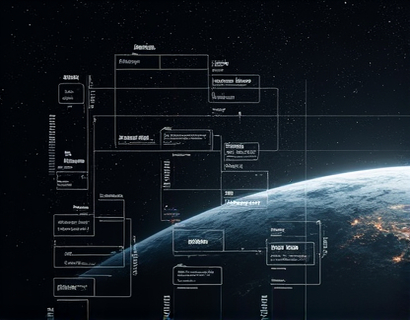Economic Dynamics and Market Opportunities in Modern Ecosystems: Insights for Success
The landscape of modern economies has evolved significantly, transforming traditional markets into complex ecosystems characterized by interconnectedness, rapid change, and unprecedented opportunities. Understanding these dynamics is crucial for economists, business leaders, investors, and industry experts aiming to stay competitive and informed. This guide delves into the strategic insights and detailed analysis necessary to navigate and capitalize on emerging market opportunities within these modern economic ecosystems.
Understanding Modern Economic Ecosystems
Modern economic ecosystems are multifaceted networks where various stakeholders, including businesses, consumers, governments, and technological platforms, interact and influence one another. Unlike traditional economies that were often segmented and isolated, these ecosystems are fluid, dynamic, and highly interconnected. The rise of digital technologies, globalization, and the sharing economy has accelerated this transformation, creating new pathways for value creation and distribution.
In these ecosystems, value is no longer created in silos but through collaborative networks. For instance, a tech startup may leverage cloud services, social media platforms, and data analytics tools provided by other companies to develop and market its product. This interdependence requires a deep understanding of the ecosystem's structure and the relationships between its components.
Key Characteristics of Modern Economic Ecosystems
Several key characteristics define modern economic ecosystems:
- Interconnectedness: The seamless flow of information, resources, and capital across different sectors and geographies.
- Dynamic Adaptation: The ability to rapidly respond to changes in technology, consumer preferences, and regulatory environments.
- Collaborative Innovation: The collective effort of various stakeholders to drive innovation and improve efficiency.
- Data-Driven Decision Making: The use of big data and analytics to inform strategic decisions and optimize operations.
- Sustainability Focus: Increasing emphasis on environmental, social, and governance (ESG) factors in business strategies.
These characteristics create a fertile ground for new market opportunities, but they also present challenges that require strategic navigation.
Identifying Market Opportunities
To identify and capitalize on market opportunities in modern economic ecosystems, it is essential to adopt a proactive and holistic approach. Here are some strategic insights:
Leverage Emerging Technologies
Emerging technologies such as artificial intelligence, blockchain, and the Internet of Things (IoT) are reshaping industries and creating new market spaces. Businesses that integrate these technologies can gain a competitive edge by enhancing efficiency, reducing costs, and offering innovative products and services. For example, AI-driven analytics can help companies make data-informed decisions, while blockchain can ensure transparency and security in supply chain management.
Entrepreneurs and established firms alike should monitor technological advancements and explore how they can be applied to their specific contexts. Collaboration with tech startups and research institutions can accelerate this process.
Focus on Customer-Centric Innovation
In a highly interconnected ecosystem, customer needs and preferences evolve rapidly. Companies must adopt a customer-centric approach to innovation, continuously gathering and analyzing feedback to refine their offerings. This involves not only understanding current customer demands but also anticipating future trends.
For instance, a retail business can use customer data to personalize shopping experiences, offering tailored recommendations and promotions. This not only enhances customer satisfaction but also drives loyalty and repeat business.
Explore Collaborative Partnerships
Partnerships and collaborations are vital in modern economic ecosystems. By forming strategic alliances with complementary businesses, startups can access new markets, technologies, and expertise. These collaborations can take various forms, such as joint ventures, licensing agreements, or co-creation initiatives.
For example, a manufacturing company might partner with a tech firm to integrate smart manufacturing solutions, improving production efficiency and product quality. Such partnerships can lead to mutual benefits and open up new revenue streams.
Embrace Sustainability and ESG
The growing focus on sustainability and ESG factors presents both a challenge and an opportunity. Companies that prioritize environmental and social responsibility can differentiate themselves in competitive markets and attract socially conscious consumers and investors.
Implementing sustainable practices, such as reducing carbon footprints, using renewable resources, and promoting diversity and inclusion, can enhance brand reputation and long-term viability. Moreover, ESG investing is on the rise, providing financial support for companies that align with these values.
Navigate Regulatory Changes
Modern economic ecosystems are subject to rapid regulatory changes, driven by technological advancements and shifting societal values. Staying informed about regulatory developments and proactively adapting business strategies is crucial.
For instance, the implementation of data protection regulations like GDPR in Europe has forced companies to reassess their data handling practices. Businesses that proactively comply with such regulations can avoid penalties and build trust with customers and stakeholders.
Strategic Approaches for Capitalizing on Opportunities
To effectively capitalize on the opportunities presented by modern economic ecosystems, businesses must adopt strategic approaches that align with the ecosystem's dynamics:
Build a Strong Digital Presence
A robust online presence is essential in today's digital economy. This includes having a user-friendly website, active social media accounts, and a strong SEO strategy to enhance visibility and reach a broader audience. Digital platforms provide valuable tools for engagement, marketing, and sales.
Investing in digital marketing, content creation, and customer experience optimization can significantly boost a company's online presence and attract more customers.
Foster a Culture of Innovation
Encouraging innovation within the organization is key to staying ahead in a fast-paced ecosystem. This involves creating an environment that supports experimentation, learning from failures, and continuous improvement.
Implementing innovation labs, hackathons, and cross-functional teams can stimulate creative thinking and lead to breakthrough ideas. Additionally, fostering a culture of lifelong learning and upskilling ensures that employees are equipped to handle new challenges.
Adopt Agile Methodologies
Agile methodologies, originally developed for software development, have proven effective in various business contexts. These approaches emphasize flexibility, iterative progress, and customer feedback, allowing companies to adapt quickly to changing market conditions.
By breaking down projects into smaller, manageable units and regularly reassessing goals and strategies, businesses can respond more effectively to opportunities and threats in the ecosystem.
Monitor and Analyze Market Trends
Staying informed about market trends and consumer behaviors is crucial for making informed decisions. Utilizing market research tools, industry reports, and data analytics can provide valuable insights into emerging trends and potential opportunities.
For example, analyzing social media conversations and online reviews can help identify customer pain points and preferences, guiding product development and marketing strategies.
Case Studies: Successful Navigation of Modern Economic Ecosystems
Examining real-world examples can provide practical insights into how businesses have successfully navigated modern economic ecosystems:
Case Study 1: Tech Startup Leveraging AI
A tech startup specializing in AI-powered customer service solutions recognized the growing demand for efficient and personalized customer interactions. By developing an AI chatbot that could handle complex queries and provide real-time support, the startup differentiated itself in a crowded market.
Through strategic partnerships with e-commerce platforms and a focus on continuous improvement based on user feedback, the company rapidly scaled its operations and attracted significant investment. This success story highlights the importance of leveraging emerging technologies and customer-centric innovation.
Case Study 2: Retailer Embracing Sustainability
A major retailer faced increasing pressure to adopt sustainable practices. By implementing a comprehensive sustainability program that included using eco-friendly materials, reducing waste, and promoting ethical sourcing, the retailer not only improved its environmental impact but also enhanced its brand reputation.
This initiative resonated with environmentally conscious consumers, leading to increased customer loyalty and sales. The case underscores the value of aligning business strategies with sustainability and ESG considerations.
Conclusion
Modern economic ecosystems present both challenges and opportunities for businesses and professionals. By understanding the ecosystem's dynamics, identifying key market opportunities, and adopting strategic approaches, stakeholders can navigate this complex landscape successfully. Whether through leveraging emerging technologies, fostering innovation, building strategic partnerships, or embracing sustainability, the key to success lies in adaptability, collaboration, and a forward-looking mindset.
As the economic landscape continues to evolve, staying informed and proactive will be essential for thriving in these dynamic ecosystems. By applying the insights and strategies outlined in this guide, professionals can position themselves and their organizations for long-term success in the modern economic ecosystem.










































